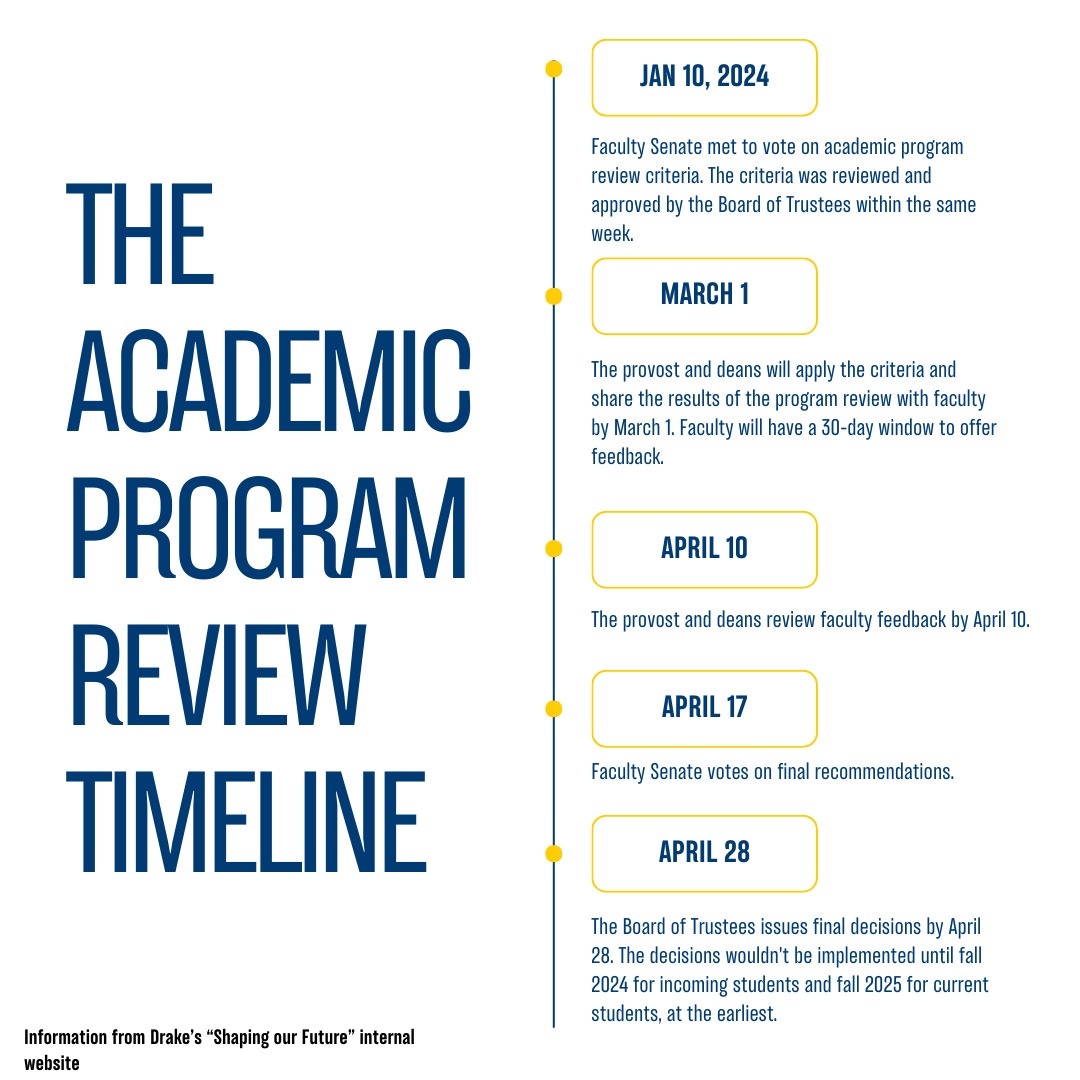Drake University will determine which academic programs to keep, improve and eliminate before the end of the semester, such as majors and minors. The program review processes the University’s goal to balance its budget for the 2026 fiscal year.
Drake has shared an internal website called “Shaping our Future” with students, which includes frequently asked questions with information about Drake’s financial state and decisions. The budget challenge is part of a nationwide issue resulting from declining enrollment in colleges and universities across the country, according to the website.
In November, Provost Sue Mattison said eliminating programs and faculty positions is “unavoidable,” The Times-Delphic reported.
Drake still needs to save approximately $2.5 to $3 million to balance its budget, according to Drake Associate Director of Communications Ashton Hockman. This amount may change. Savings from program review will be part of that amount, but how much is not yet known, Hockman said over email.
Recent cuts to the Drake curriculum are also expected to save money for the University, the TD reported.
Academic programs and faculty positions will remain the same this academic year, Hockman said. The Board of Trustees and Faculty Senate have approved criteria that will be used to recommend whether programs should be kept, improved or eliminated.
Faculty will have thirty days’ notice to give feedback on programs and faculty positions recommended for elimination, according to the Faculty Senate Budget Committee’s Dec. 20 report. Drake’s Faculty Senate will vote on final recommendations on April 17, the “Shaping Our Future” website says.
When Faculty Senate votes, Drake will not know the exact amount of money that the University needs to save through program review, according to Hockman. They will decide whether to approve program cuts based on Drake’s best estimate. This is because it’s difficult to predict enrollment and therefore the amount of tuition dollars that will flow into the University.
Recommendations must be approved by the Board of Trustees and Faculty Senate (or the affected faculty), according to the Faculty Senate Budget Committee’s Dec. 20 report. This is consistent with guidelines from the American Association of University Professors and the Drake University Charter, the report said.
President Marty Martin must also approve the elimination of a program, according to Hockman. The Board’s final decision will be communicated to faculty on April 28.
Drake won’t implement program changes until, at the earliest, fall 2025 for current students and fall 2024 for entering students, Hockman said.
“Rest assured, no adjustments will be made to any program that would inhibit students from completing their program, once enrolled,” Hockman said over email with the TD.
While Drake has guaranteed that current students will be able to complete their degrees, a student might have to take a different class to meet a requirement, according to Faculty Senator William Boal of the Zimpleman College of Business.
“I think we’ve got a pretty good advising infrastructure now,” Boal said. “We’ve got these advising specialists on campus. I think we have the resources to work something out for everybody that’s helpful. [Something] that may be not exactly what they’re hoping for but probably something pretty close.”
Working on a quick timeline
While they recognize the urgency of the situation, Faculty Senators Debra DeLaet and Megan Brown of the College of Arts and Sciences said the pace of this timeline is too quick and makes it difficult to have necessary conversations with their constituents. Senator Melisa Klimaszewski of Arts and Sciences said it’s undeniable that there is “not enough time to have conversations with all the stakeholders in a meaningful way.”
“I won’t lie to you. I will say that it was very difficult to have some of these conversations on Zoom during J-Term when some of us are in other countries and teaching classes and doing this and that,” Brown said. “I was here anyway, but for a lot of people, it was much more difficult. I can’t comment for them, but in an ideal world, there would be more time to reflect on these things.”
The mandate to meet the 2026 goal was set by the Board of Trustees, DeLaet said. Decisions about deadlines also consider American Association of University Professors guidelines.
At the December meeting of Faculty Senate, Brown requested that President Martin ask the Board for an extension, which DeLaet said made her hopeful for a change. After recent follow-up emails, she is no longer optimistic about the request being met.
Boal said the fast pace of the timeline is making people nervous, but he believes that it is important to make prompt decisions. He said making this decision would allow people to go back to their teaching and research less nervous than before.
“It’s a difficult process, and I think the campus leadership is right in trying to make a decisive move now,” Boal said. “I hope we can come up with a long-term framework where we can avoid these situations in the future.”
Difficulties with data
One source of information for the program review is Academic Financial Analysis (AFA) data, the budget committee’s Dec. 20 report said. This financial metric can be used to determine how much revenue a course section brings into the University and how much it costs the university through instruction and administrative support.
Brown expressed worry about the limitations of AFA data. For example, she said AFA data will often make it look like a department has a large number of under-enrolled courses if they tend to cross-list a majority of their courses with other departments. She said this is because AFA data may count a full cross-listed course as two half-filled courses.
Klimaszewski said utilizing AFA data does not consider the differences between departments and the benefits of small class sizes.
“Most of my students who have had really transformational experiences at Drake have been in very small classes, so I do think that if students find small class sizes to be important, they should advocate for that,” Klimaszewski said.
The timeline in the budget committee report gives deans and department chairs “an opportunity to respond to data on metrics in the dashboard to ensure accuracy.”
The report also says that “data should be used to analyze departments and programs with respect to their historical performance rather than competitively with one another.”
Boal said that for a lot of Drake department chairs, thinking about the financial viability of their programs is brand new.
“I think a lot of department chairs up to now have been thinking about trying to provide the best education they could,” Boal said. “Hire the sharpest people, offer the most interesting and most relevant classes, push students to learn a lot and so forth.”
Easing the transition for students
Klimaszewski said she wants students to know how passionately their faculty members are dedicated to their learning and their well-being.
“We’re ready to go to the mat for students,” Klimaszewski said. “A lot of us already have. So I think students should feel really secure in knowing that their faculty and their administration are really focused on them.”
Hockman said Drake is committed to transparency during the program review process and values student input.
“If students have input, we encourage them to share their thoughts with their student senators who can relay information to University leaders,” Hockman said








